
|
||||||||||||||||||||||
 |
||||||||||||||||||||||
 |
||||||||||||||||||||||
 |
||||||||||||||||||||||
 |
||||||||||||||||||||||
 |
||||||||||||||||||||||
 |
| The current issue is always free to everyone |
|
|
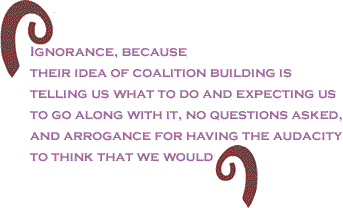 |
I had no intention of addressing last week’s California Supreme Court 4-3 ruling, which held that same-sex couples have a constitutional right to marry. I politely declined several media interviews regarding the decision and choose to post nothing on my site about it. Now, for the record, I am a lesbian. So obviously, I agree with the ruling. However, I disassociated myself from the movement
sometime ago when it became clear and apparent that the groups
here in California and in Washington, leading the charge, were
more concerned with obtaining gay marriage than any other issue
affecting lesbian, gay, bisexual, and transgender people. They
were more concerned with reciting quotes from Black civil
rights leaders and groundbreaking court cases and pimping out
photos of Black gay and lesbian couples on their websites than
hearing the concerns of Black same-gender loving people - concerns
that most certainly extend into the Having failed for the most part at infiltrating the Black gay community and getting us to act as surrogates to deliver their message of marriage over everything else in our community, today these groups remain completely oblivious. Chalk it up to ignorance and arrogance. Ignorance, because their idea of coalition building is telling us what to do and expecting us to go along with it, no questions asked, and arrogance for having the audacity to think that we would.
So when the ruling came down I just sat back and watched for what I knew was going to happen and for what did happen. The L.A. Gay and The Los Angeles Times gave the ruling
prime coverage in the A section the following day. Coverage
that was void of any color. To television news’ credit, while
they didn’t feature any gays of color, they did cut to a group
of protesters against gay marriage that prominently featured
African-Americans. More recently, the Los Angeles Times
has published an article featuring liberal and conservative
voices from congregations throughout It wasn’t until I got to the end of the article, which is titled, “Coming to grips with same-sex marriage ruling,” that I was finally moved enough to write about last week’s ruling. And I quote:
I want to put this in perspective for you. Out
of all the mainstream media coverage in But when the conversation turned to the church…you get the picture. Maybe had there been some sort of balance in the recent media blitz over the ruling, a balance that illustrated the melting pot we’re always claiming to be, perhaps I wouldn’t be so annoyed with Pastor Epps’ quote in the Times.
With the gay groups, I know that their reasons for exclusion has to do more with the fact that unless they can use Black gays to carry their message to the larger Black community, we’re for the most part no good to them, except for the occasional website profile, mailer, or grant application. With the mainstream media, there seems to be no real interest in thinking outside the box that has been drawn for them by said gay groups. That is why we see the same faces and hear the same voices on all things gay. The same organizations are looked to as the authoritative representation of the gay community similar to the way that Rev. Al Sharpton and Rev. Jesse Jackson are looked to when Blacks are upset. And even though Los Angeles is home to a plethora of respected Black clergy that is affirming of lesbians and gays, including Agape’s Rev. Michael Beckwith, Rev. Eric Lee of the Southern Christian Leadership Conference of Greater Los Angeles, and civil rights icon Rev. James Lawson, those voices are almost never chosen to represent the voice of reason and African-Americans on gay issues. No, we’ve got to be portrayed as being negative, helping to fuel the notion that Blacks are homophobic.
Had the Times reporters gone back a few
years in their archives, they would have come across an article
written by their now retired colleague, reporter Gayle Pollard-Terry
titled, “A Shout Rings Out,” which profiled Black gay Christians
and drew national attention. The article featured Unity Fellowship
Church Movement, a 26 year-old Black church headquartered in
Yes, that’s right, the pastor whose comments were inaccurately portrayed by the media as being unpatriotic and then used by presidential candidate Sen. Barack Obama’s opponents to distract voters, is and has been a supporter for equal rights of lesbian and gay couples. That somehow was missed in all of the criticism being hurled at Wright. In 2004, I will never forget receiving an email from Dr. Wright praising my commentary “Pastor Thou Art Loose” and asking for permission to reprint it in Trinity’s weekly Sunday bulletin. I remember speaking to him briefly about it on the phone and thanking him for taking the time to read it and offering to share it with his congregation. I received countless emails from various members of Trinity after it was published in their bulletin, also praising my commentary, giving me hope that all Blacks are not homophobic. Last week’s ruling by the California Supreme Court was unprecedented and has set the stage for another national dialogue on equal rights for lesbians and gays, a dialogue that will eventually extend to the 2008 presidential campaign. I fully expect a repeat of 2004 that saw the Republican Party use the issue of gay marriage to convince Blacks to vote against their best interests. After all, that’s what Republicans do best - use the Bible to invoke mass hysteria at the polls. Hopefully this go round, the fact that we’re in a recession and a never-ending war, coupled with a Black Democratic nominee and a little common sense, Blacks won’t be so easily tricked into voting against their best economic interests AGAIN, with bias media reports portraying all gays to be white and all Blacks to be homophobic. Hopefully. BlackCommentator.com Columnist,
Jasmyne Cannick, is a critic and commentator based in |
Your comments are always welcome. e-Mail
re-print notice
If you send us an e-Mail message we may publish all or part of it, unless you tell us it is not for publication. You may also request that we withhold your name. Thank you very much for your readership. |
|
| May
22, 2008 Issue 278 |
|
| Executive Editor: Bill Fletcher, Jr. |
| Managing
Editor: |
| Publisher: Peter Gamble |
| Est. April 5, 2002 |
| Printer Friendly Version in resizeable plain text format or pdf format. |
 |
 |
 |
| |
| |





















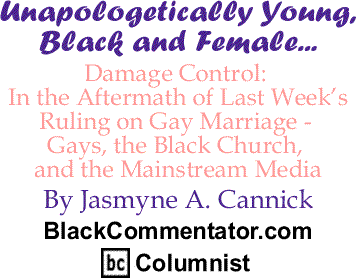
 Since
the ruling, these same groups have been busy invading my inbox
with emails about why I need to give them my money so that they
can fight for my right to marry. I have yet to receive an email
from these same groups about the upcoming
Since
the ruling, these same groups have been busy invading my inbox
with emails about why I need to give them my money so that they
can fight for my right to marry. I have yet to receive an email
from these same groups about the upcoming 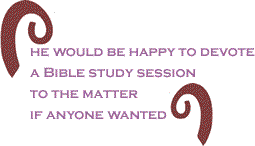 Epps’
quote isn’t alarming. After all, he was asked his thoughts and
he gave them. What bothers me is that almost never is the voice
of reason on gay issues an African-American. If I didn’t know
any better, I’d think there wasn’t a Black church in the country
that supported equal rights for lesbians and gays.
Epps’
quote isn’t alarming. After all, he was asked his thoughts and
he gave them. What bothers me is that almost never is the voice
of reason on gay issues an African-American. If I didn’t know
any better, I’d think there wasn’t a Black church in the country
that supported equal rights for lesbians and gays.
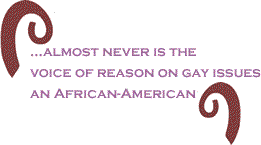
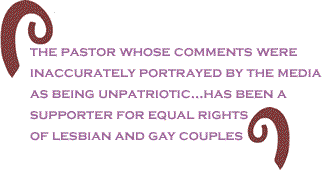 Nationally,
the list of prominent Black clergy supporting the right of lesbians
and gays to marry has grown exponentially over past several
years to include among others: Rev. Al Sharpton, Rev. William
Sinkford, President, Unitarian Universalist Church, Rev. Peter
Gomes, Harvard University Chaplain, Dr. Michael Eric Dyson,
his wife Rev. Marcia Dyson, and Rev. Dr. Jeremiah Wright, former
pastor of Trinity United Church of Christ.
Nationally,
the list of prominent Black clergy supporting the right of lesbians
and gays to marry has grown exponentially over past several
years to include among others: Rev. Al Sharpton, Rev. William
Sinkford, President, Unitarian Universalist Church, Rev. Peter
Gomes, Harvard University Chaplain, Dr. Michael Eric Dyson,
his wife Rev. Marcia Dyson, and Rev. Dr. Jeremiah Wright, former
pastor of Trinity United Church of Christ.







